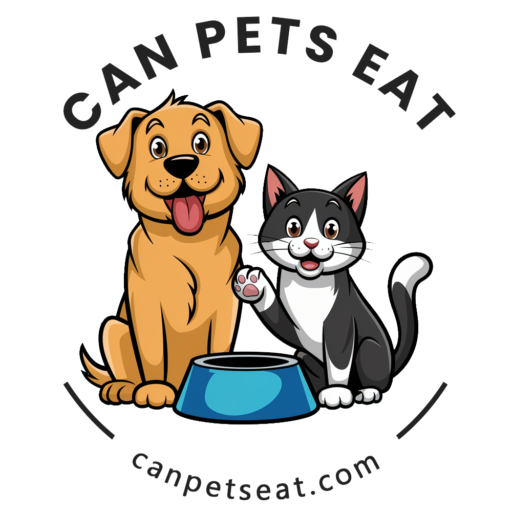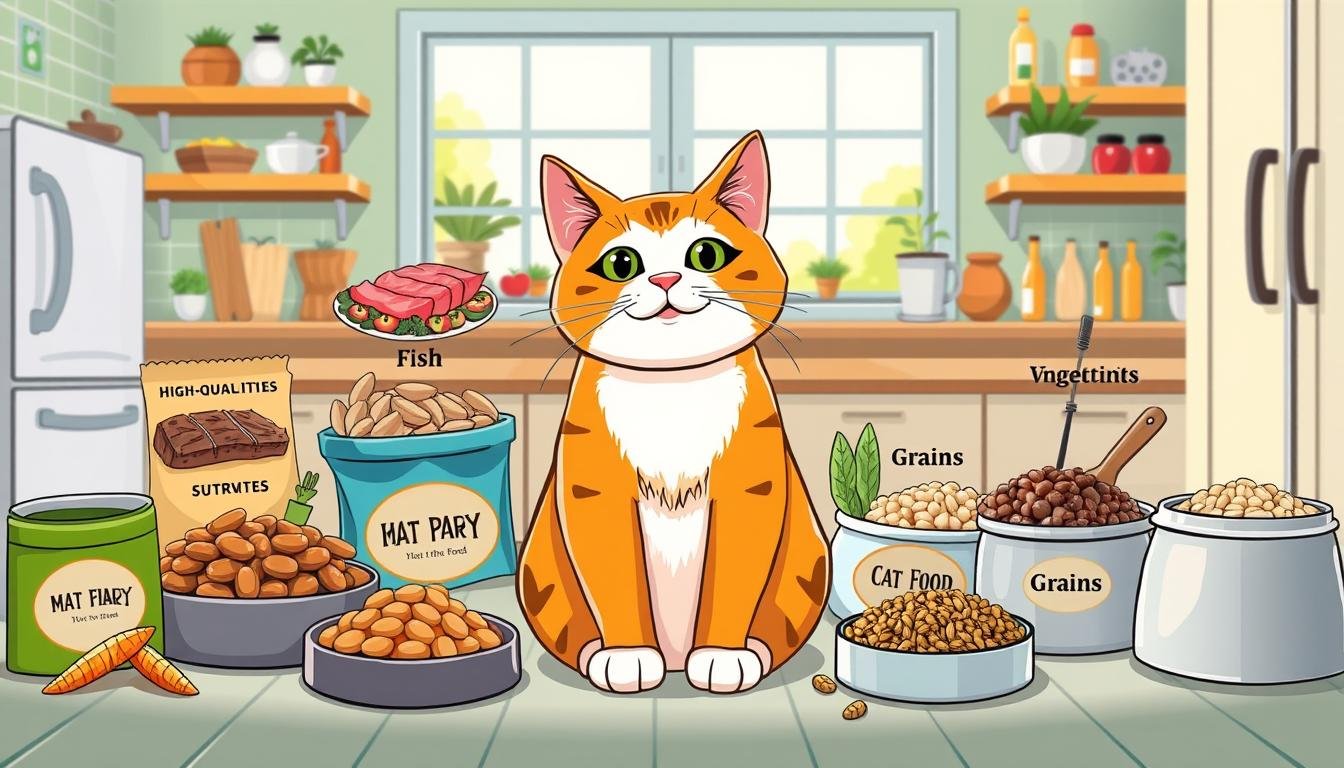As a cat owner, I’ve often wondered if it’s safe for my feline friend to eat dog food, even in emergencies. Cats need different nutrients than dogs, leading to a lack of essential nutrients if fed dog food for too long1. This makes me question: can cats safely eat dog food, or are there health risks from cross-species feeding, focusing on cat nutrition and dog food?
Key Takeaways
- Cats are obligate carnivores and require a diet high in protein and fat, which is not met by dog food1.
- Dog food lacks specific nutrients vital for feline health, such as taurine and arachidonic acid1.
- Cat food is generally more calorie-dense than dog food due to higher protein content1.
- Maintaining a healthy weight can extend a cat’s lifespan by an average of two years compared to overweight pets1.
- Feeding practices, such as separating dog and cat feeding areas, can help prevent cats from consuming dog food excessively1.
Understanding the Basics of Cat and Dog Nutrition
As a cat owner, knowing what your cat needs is key. Cats need lots of protein, taurine, and arachidonic acid. These are not enough in dog food2. Dog food, made for dogs, doesn’t meet a cat’s needs. Dogs can eat both meat and plants, but cats need mostly meat2.
Good protein for dogs and cats must have all the right amino acids. For cats, taurine is crucial. The best pet food starts with real meat for top nutrition2. Cats are very sensitive to diseases from raw poultry, like H5N13. It’s important to know the difference between cat and dog food.
- Cats need lots of protein and taurine
- Dog food is not good for cats
- Cats must eat mostly meat
- Good protein is key for both cats and dogs
Learning about cat and dog nutrition helps you choose the right food. Whether it’s dog food or cat food, pick something high-quality. This ensures your cat gets the nutrients they need to stay healthy2.
Can Cats Eat Dog Food in Emergency Situations?
As a cat owner, it’s key to think about the risks of giving dog food to your cat, even in emergencies. Dog food can cause nutritional gaps and health issues in cats4. Experts say cats need different food than dogs. Giving them dog food can cause digestive problems and harm their organs.
In emergencies, it’s vital to focus on your cat’s health by giving them the right food. Emergency feeding with dog food can harm your cat’s health. It’s important to look for other options. You can talk to your vet or contact a local animal shelter for help with emergency feeding. When it comes to cat nutrition, choose high-quality, nutrient-rich food that fits your cat’s needs5.
Here are some key considerations for emergency feeding:
- Avoid feeding your cat dog food as a substitute for their regular meals
- Consult with your veterinarian for guidance on emergency feeding
- Prioritize high-quality, nutrient-rich food that meets your cat’s specific needs
By focusing on your cat’s health, you can make sure they get the nutrients they need, even in emergencies. Remember, cat nutrition is crucial. It’s important to make smart choices about your cat’s diet to avoid health issues and ensure they live a happy, healthy life4.
The Nutritional Impact of Dog Food on Cats
Dog food is not good for cats because it lacks important nutrients. Cats need at least 30-34% protein to stay healthy6. Dog food doesn’t have enough amino acids and taurine for cats, causing health issues6.
Cats need animal-based proteins because they are obligate carnivores7. Dog food only has 18-26% protein, which is not enough for cats6.
| Nutrient | Cat Requirement | Dog Food Content |
|---|---|---|
| Protein | 30-34% | 18-26% |
| Taurine | Essential | Often lacking |
Dog food also lacks vitamins and minerals that cats need. Eating dog food regularly can cause heart problems and other health issues in cats6. It’s crucial to feed cats a diet that’s balanced for their nutritional needs, not dog food7.
Immediate Effects of Feeding Your Cat Dog Food
Feeding your cat dog food can cause immediate effects on their health. This includes digestive issues and nutrient deficiencies8. Cats need at least 30-34% protein to stay healthy, which dog food often doesn’t provide8.
Dog food also lacks important nutrients like taurine, arachidonic acid, and vitamin A. These are crucial for a cat’s health8.
Some immediate effects of feeding dog food to cats include:
- Digestive problems, such as diarrhea and vomiting9
- Nutrient deficiencies, mainly in taurine and vitamin A8
- Increased risk of obesity and related health issues9
Cats have unique dietary needs that differ from dogs. Feeding them dog food can lead to serious health problems8. If you’re thinking about feeding your cat dog food, talk to a vet first. They can help discuss the risks and find better options9.
For cat health, it’s key to meet their nutritional needs. This prevents digestive issues and nutrient deficiencies8. By choosing the right food, you can keep your cat healthy and avoid needing vet care9.
| Food Type | Protein Content | Essential Nutrients |
|---|---|---|
| Cat Food | 40-50% | Taurine, Arachidonic Acid, Vitamin A |
| Dog Food | 18-26% | Lacking essential nutrients for feline health |
Long-term Consequences of Regular Dog Food Consumption
As a cat owner, it’s crucial to know the risks of feeding dog food to your cat. Dog food can cause heart issues and vision loss10. Cats need at least 30-34% protein, but dog food only has 18-26%10.
Feeding your cat dog food for a long time can be harmful. It can lead to nutrient deficiencies and obesity10. Also, dog food often lacks taurine, which cats need10.
Some health risks of feeding dog food to cats include:
- Weakened hearts (dilated cardiomyopathy)
- Vision loss
- Developmental delays in kittens
It’s vital to give your cat a balanced diet. Dog food can cause poor coat, weak immune systems, and reproductive issues10. As a responsible owner, choose high-quality cat food for your cat’s health.
Signs Your Cat Has Eaten Dog Food
As a cat owner, knowing the signs your cat has eaten dog food is key. This can harm their health11. Look out for digestive problems like vomiting or diarrhea. Also, watch for changes in behavior, such as being more tired or restless12.
Cats need certain nutrients that dog food doesn’t provide well. These include taurine and arachidonic acid11. If your cat has eaten dog food, you might see these signs:
- Digestive issues, such as vomiting or diarrhea
- Changes in behavior, like increased lethargy or restlessness
- Loss of appetite or decreased interest in their regular cat food
Keep an eye on your cat’s health, even if you have dogs and cats together13. Regular vet visits are important, too. This is true, even if your cat only eats dry food12.
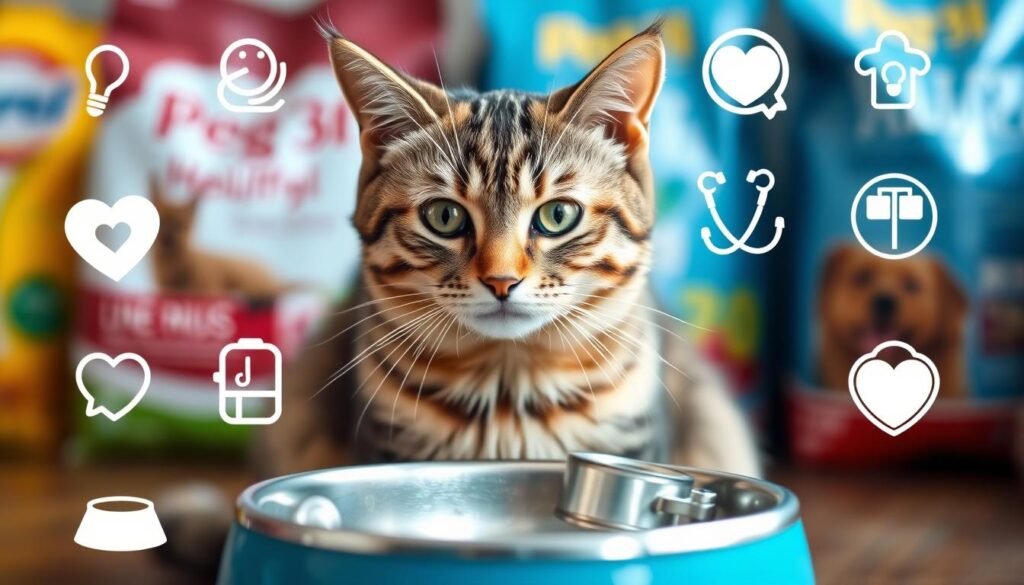
Being aware of these signs and taking steps to prevent them can protect your cat’s health. This way, you can avoid any risks from eating dog food11.
What to Do If Your Cat Regularly Steals Dog Food
To stop your cat from eating dog food, you need to take action. Feed your cat in a separate room and use a baby gate to keep them away from dog food14. Also, make sure they get a balanced diet that fits their nutritional needs. This can help them not want dog food as much.
It’s important to understand why cats might eat dog food. Dog food often lacks nutrients like taurine, which is bad for cats14. Knowing the difference between cat and dog food helps you keep your cat healthy and away from dog food.
Prevention Strategies
- Feed your cat in a separate room to reduce access to dog food
- Use a baby gate to block access to the dog’s food
- Provide a balanced and nutritious diet that meets your cat’s nutritional needs
Using these strategies can protect your cat’s health and stop them from eating dog food. Keep an eye on your cat’s behavior and change your approach if needed to make sure they get the right nutrients14.
Every cat is unique, so what works for one might not work for another. By knowing your cat’s special needs and habits, you can find the best ways to keep them healthy and happy15.
The Veterinary Perspective on Cross-Species Feeding
From a veterinary perspective, feeding different species can be tricky. Veterinarians say feeding dog food to cats can cause health issues16. This is because cats need a special mix of nutrients that dog food might not have.
Feeding dogs to cats can lead to nutritional problems. Cats need more protein and different nutrients than dogs do17. Dog food might not give cats enough protein.
Some key differences in cat and dog nutrition include:
- Protein requirements: Cats need more protein than dogs.
- Fat content: Dog food has more fat, which can cause weight gain and health issues in cats.
- Vitamin and mineral content: Cat food has different levels of vitamins and minerals than dog food, leading to deficiencies if cats eat dog food.
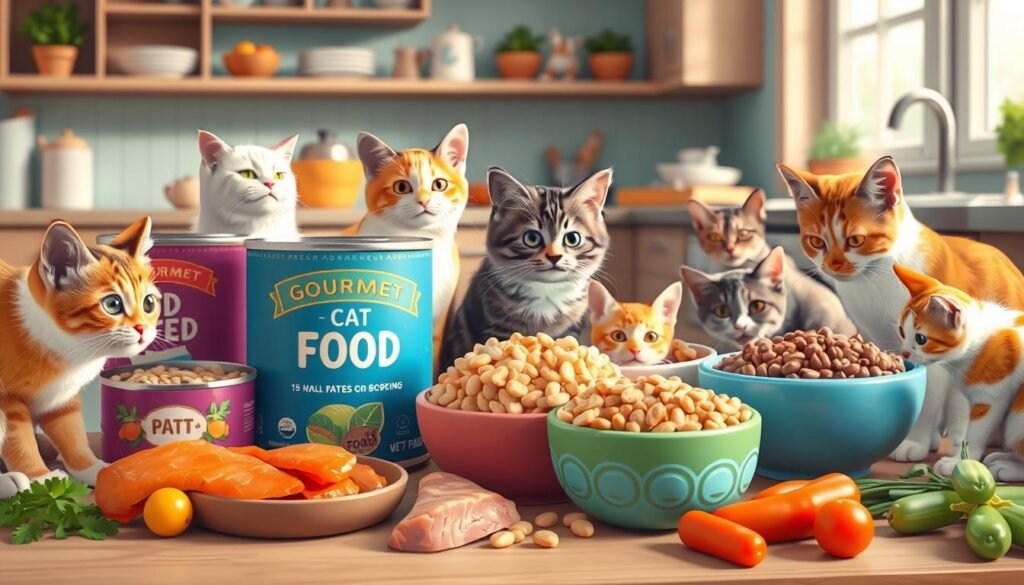
In summary, veterinarians stress the need for a balanced diet for each species. Feeding dog food to cats is not recommended due to the risk of nutritional deficiencies and health problems18.
| Species | Protein Requirements | Fat Content | Vitamin and Mineral Content |
|---|---|---|---|
| Cats | Higher proportion of protein | Lower fat content | Different levels of vitamins and minerals |
| Dogs | Lower proportion of protein | Higher fat content | Different levels of vitamins and minerals |
Common Myths About Feeding Cats Dog Food
Many people think dog food is okay for cats, but this is a big mistake. Cats need certain nutrients that dogs don’t, like more protein and taurine19. They are obligate carnivores, meaning they must eat meat to stay healthy20.
Another myth is that cats can eat both animal and plant-based foods like dogs do21. But, cats need a lot of animal protein and special amino acids, like taurine, to stay healthy. Knowing these differences is key to feeding our cats right.
Some common myths about feeding cats dog food include:
- Dog food is a suitable substitute for cat food
- Cats can thrive on a diet that includes both animal and plant-based ingredients
- Cats do not require specific amino acids, such as taurine
It’s important to clear up these myths and give our cats the right food20.
By understanding the myths about dog food and cat nutrition, we can make better choices for our cat’s diet. This way, we can give them the best care possible21.
| Myth | Reality |
|---|---|
| Dog food is a suitable substitute for cat food | Cats have specific nutritional requirements that are distinct from dogs |
| Cats can thrive on a diet that includes both animal and plant-based ingredients | Cats require a diet rich in animal-based protein and specific amino acids |
Alternative Solutions for Emergency Situations
In emergency situations, it’s key to have backup plans for your cat’s safety. The ASPCA says it’s important to keep enough food and water for pets for at least seven to ten days22. Also, keep at least 2 to 4 weeks of prescription medications for pets ready for emergencies or evacuations23.
A pet emergency kit should have many supplies. This includes a commercial pet first aid kit with non-stick pads, gauze, scissors, and more23. It’s also smart to have emergency vet contact info ready24. For cat nutrition, give them a balanced diet that fits their needs, not dog food or other bad alternatives.
Some good emergency solutions include:
- Feeding a balanced and nutritious cat food
- Seeking veterinary advice
- Maintaining an extra bag of kibble or a case of cans
- Having a pet emergency kit with essential supplies
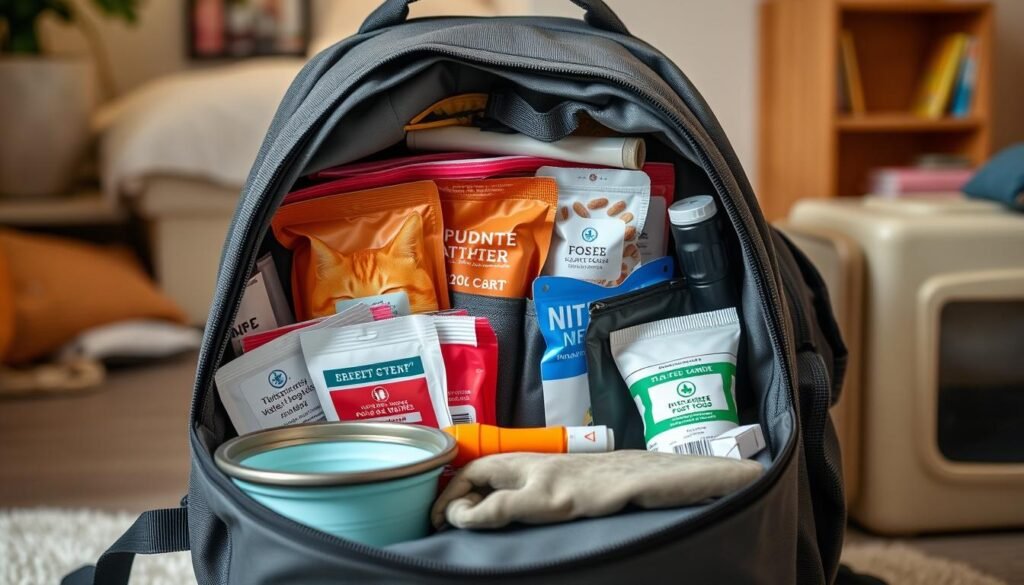
With these solutions, you can keep your cat safe and healthy in emergencies. Always remember to focus on your cat’s nutritional needs and get vet advice if unsure22.
| Emergency Supply | Recommended Quantity |
|---|---|
| Food and water | 7-10 days’ worth |
| Prescription medications | 2-4 weeks’ worth |
| Pet first aid kit | 1 kit per pet |
Conclusion: Making Informed Decisions About Your Cat’s Diet
As a cat owner, it’s key to make smart choices about their food. Knowing what cats need differently than dogs helps me give them the best diet. This ensures they stay healthy and happy25.
Feeding cat food to dogs in an emergency is tempting, but it’s risky. Cats need specific nutrients that dog food can’t provide25. Talking to my vet helps me find safe, nutritious options for my cat26.
Choosing the right food for my cat is a big responsibility. Keeping up with new research and advice helps me give them the best nutrition25. This keeps them healthy and avoids problems that can come from feeding them the wrong food25.
